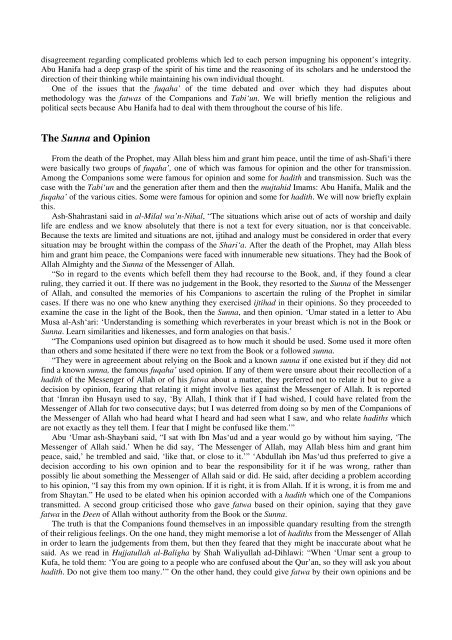Create successful ePaper yourself
Turn your PDF publications into a flip-book with our unique Google optimized e-Paper software.
disagreement regarding complicated problems which led to each person impugning his opponent’s integrity.<br />
<strong>Abu</strong> <strong>Hanifa</strong> had a deep grasp of the spirit of his time <strong>and</strong> the reasoning of its scholars <strong>and</strong> he understood the<br />
direction of their thinking while maintaining his own individual thought.<br />
One of the issues that the fuqaha’ of the time debated <strong>and</strong> over which they had disputes about<br />
methodology was the fatwas of the Companions <strong>and</strong> Tabi‘un. We will briefly mention the religious <strong>and</strong><br />
political sects because <strong>Abu</strong> <strong>Hanifa</strong> had to deal with them throughout the course of his life.<br />
The Sunna <strong>and</strong> Opinion<br />
From the death of the Prophet, may Allah bless him <strong>and</strong> grant him peace, until the time of ash-Shafi‘i there<br />
were basically two groups of fuqaha’, one of which was famous for opinion <strong>and</strong> the other for transmission.<br />
Among the Companions some were famous for opinion <strong>and</strong> some for hadith <strong>and</strong> transmission. Such was the<br />
case with the Tabi‘un <strong>and</strong> the generation after them <strong>and</strong> then the mujtahid <strong>Imam</strong>s: <strong>Abu</strong> <strong>Hanifa</strong>, Malik <strong>and</strong> the<br />
fuqaha’ of the various cities. Some were famous for opinion <strong>and</strong> some for hadith. We will now briefly explain<br />
this.<br />
Ash-Shahrastani said in al-Milal wa’n-Nihal, “The situations which arise out of acts of worship <strong>and</strong> daily<br />
life are endless <strong>and</strong> we know absolutely that there is not a text for every situation, nor is that conceivable.<br />
Because the texts are limited <strong>and</strong> situations are not, ijtihad <strong>and</strong> analogy must be considered in order that every<br />
situation may be brought within the compass of the Shari‘a. After the death of the Prophet, may Allah bless<br />
him <strong>and</strong> grant him peace, the Companions were faced with innumerable new situations. They had the Book of<br />
Allah Almighty <strong>and</strong> the Sunna of the Messenger of Allah.<br />
“So in regard to the events which befell them they had recourse to the Book, <strong>and</strong>, if they found a clear<br />
ruling, they carried it out. If there was no judgement in the Book, they resorted to the Sunna of the Messenger<br />
of Allah, <strong>and</strong> consulted the memories of his Companions to ascertain the ruling of the Prophet in similar<br />
cases. If there was no one who knew anything they exercised ijtihad in their opinions. So they proceeded to<br />
examine the case in the light of the Book, then the Sunna, <strong>and</strong> then opinion. ‘Umar stated in a letter to <strong>Abu</strong><br />
Musa al-Ash‘ari: ‘Underst<strong>and</strong>ing is something which reverberates in your breast which is not in the Book or<br />
Sunna. Learn similarities <strong>and</strong> likenesses, <strong>and</strong> form analogies on that basis.’<br />
“The Companions used opinion but disagreed as to how much it should be used. Some used it more often<br />
than others <strong>and</strong> some hesitated if there were no text from the Book or a followed sunna.<br />
“They were in agreeement about relying on the Book <strong>and</strong> a known sunna if one existed but if they did not<br />
find a known sunna, the famous fuqaha’ used opinion. If any of them were unsure about their recollection of a<br />
hadith of the Messenger of Allah or of his fatwa about a matter, they preferred not to relate it but to give a<br />
decision by opinion, fearing that relating it might involve lies against the Messenger of Allah. It is reported<br />
that ‘Imran ibn Husayn used to say, ‘By Allah, I think that if I had wished, I could have related from the<br />
Messenger of Allah for two consecutive days; but I was deterred from doing so by men of the Companions of<br />
the Messenger of Allah who had heard what I heard <strong>and</strong> had seen what I saw, <strong>and</strong> who relate hadiths which<br />
are not exactly as they tell them. I fear that I might be confused like them.’”<br />
<strong>Abu</strong> ‘Umar ash-Shaybani said, “I sat with Ibn Mas‘ud <strong>and</strong> a year would go by without him saying, ‘The<br />
Messenger of Allah said.’ When he did say, ‘The Messenger of Allah, may Allah bless him <strong>and</strong> grant him<br />
peace, said,’ he trembled <strong>and</strong> said, ‘like that, or close to it.’” ‘Abdullah ibn Mas‘ud thus preferred to give a<br />
decision according to his own opinion <strong>and</strong> to bear the responsibility for it if he was wrong, rather than<br />
possibly lie about something the Messenger of Allah said or did. He said, after deciding a problem according<br />
to his opinion, “I say this from my own opinion. If it is right, it is from Allah. If it is wrong, it is from me <strong>and</strong><br />
from Shaytan.” He used to be elated when his opinion accorded with a hadith which one of the Companions<br />
transmitted. A second group criticised those who gave fatwa based on their opinion, saying that they gave<br />
fatwa in the Deen of Allah without authority from the Book or the Sunna.<br />
The truth is that the Companions found themselves in an impossible qu<strong>and</strong>ary resulting from the strength<br />
of their religious feelings. On the one h<strong>and</strong>, they might memorise a lot of hadiths from the Messenger of Allah<br />
in order to learn the judgements from them, but then they feared that they might be inaccurate about what he<br />
said. As we read in Hujjatullah al-Baligha by Shah Waliyullah ad-Dihlawi: “When ‘Umar sent a group to<br />
Kufa, he told them: ‘You are going to a people who are confused about the Qur’an, so they will ask you about<br />
hadith. Do not give them too many.’” On the other h<strong>and</strong>, they could give fatwa by their own opinions <strong>and</strong> be














